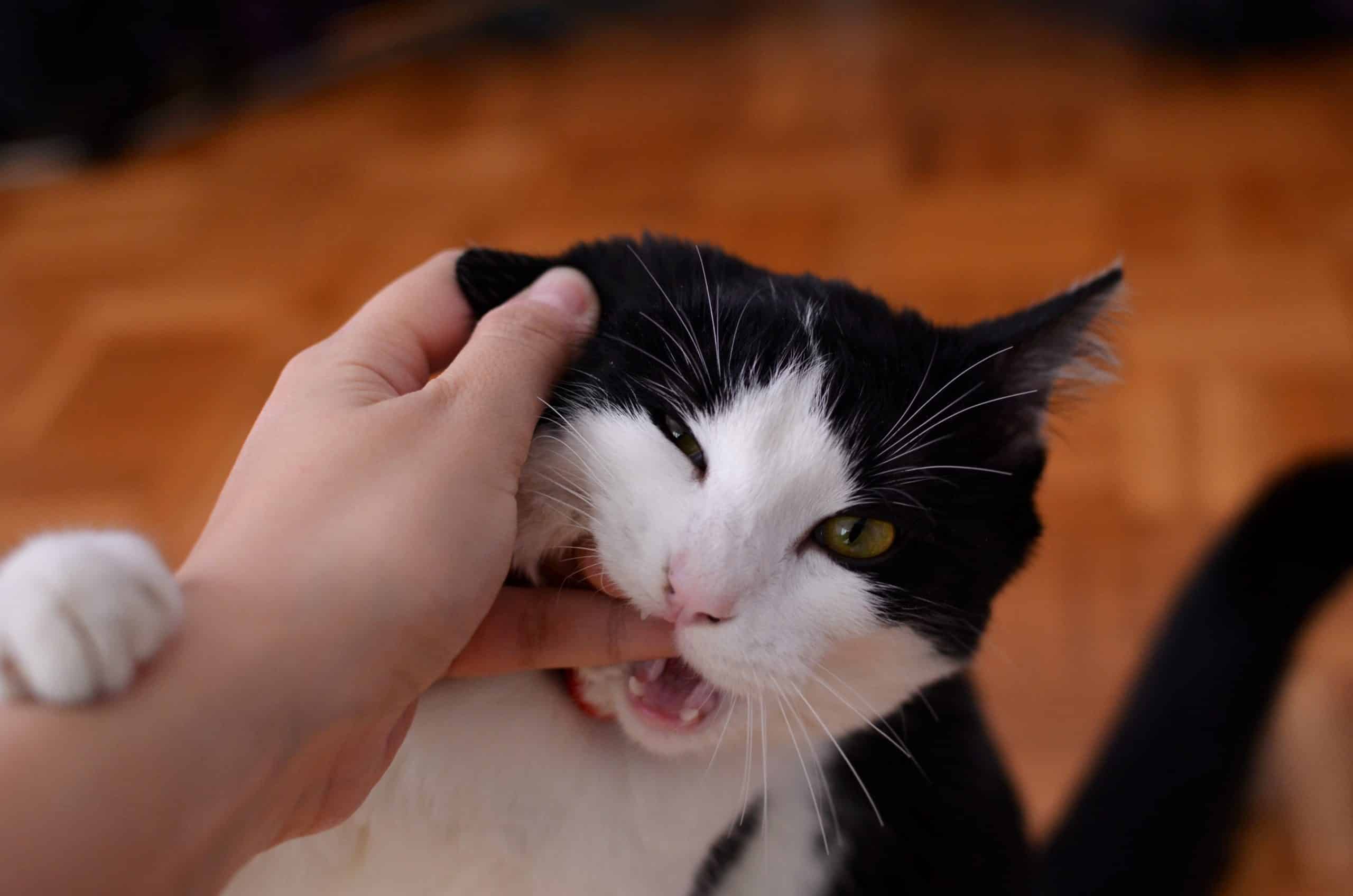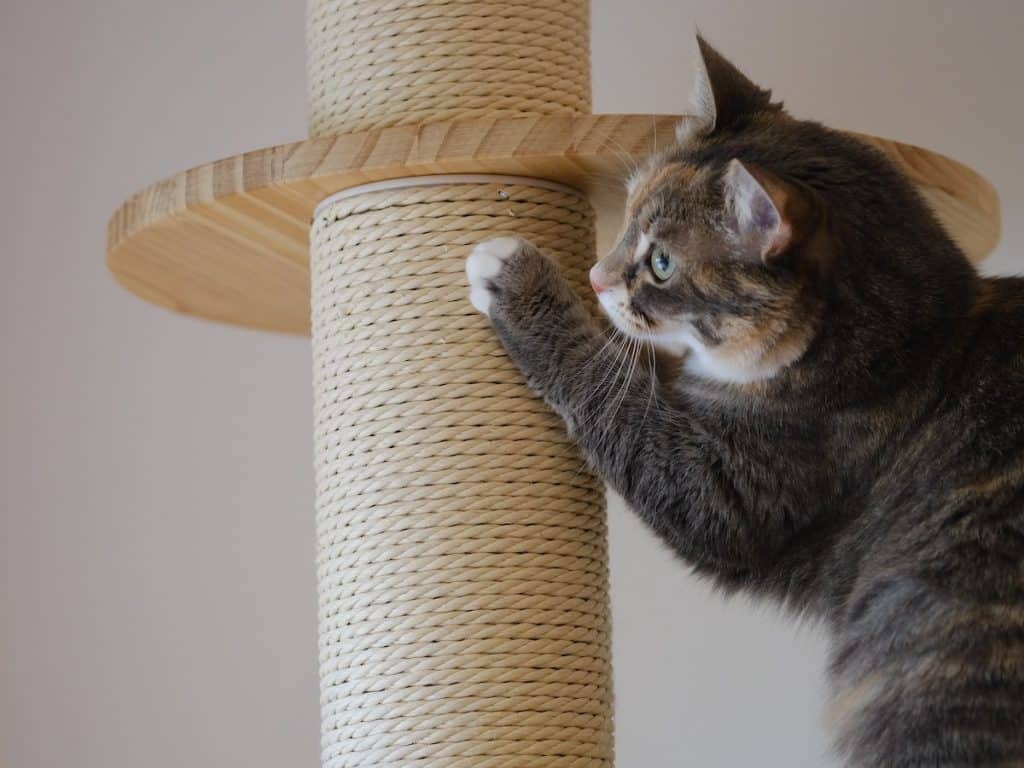Becoming the owner of a kitten can be exciting and fulfilling, and ‘how to stop a kitten from biting and scratching‘ is a common concern for new cat owners. These furry creatures quickly become part of your family while providing companionship and entertainment. Unfortunately, new cat owners sometimes face the difficulty of dealing with their kitten’s biting and scratching behavior; here we explore its causes as well as eight effective solutions. In most cases, training your kitten to avoid these behaviors should work. It would help if you learned why your feline friend may be inclined to bite and scratch and how best to address this behavior issue.
Understanding Kitten Behavior
Before diving into the methods to curb biting and scratching, it’s essential to understand your kitten’s behavior. Kittens are playful and curious by nature. They often use their mouths and claws to explore their environment and interact with their human companions. While this behavior is normal, it can become problematic if left unchecked.
Why Do Kittens Bite and Scratch?
Kittens bite and scratch for various reasons:
Teething: Kittens go through a teething phase, and biting helps relieve their discomfort.
Playfulness: Biting and scratching are typical forms of play for kittens.
Exploration: Kittens use their mouths and paws to learn about the world around them.
Communication: Biting or scratching can be a way for kittens to communicate their needs or feelings.
Training Kittens: The Importance of Early Intervention
It’s crucial to address these behaviors early. A kitten’s habits are more malleable during their formative months. This means that with the right training and guidance, you can help your kitten develop appropriate behavior.
Make sure your kitten’s behavior does not seem to be related to anything that makes it feel scared. Is it only scratching in certain places in the house, around certain people or animals? You may want to consider the possibility that your child is afraid. If you are unsure of the cause of the biting or scratching of your kitten, consult your veterinarian.
How to Stop a Kitten from Biting and Scratching?
5.1 Fostering Positive Behavior with Appropriate Toys
When addressing ‘how to stop a kitten from biting and scratching,’ one of the keys is guiding their behavior with suitable toys. Kittens are naturally playful and inquisitive, and offering them toys designed for their needs is essential.
To deter unwanted behavior, such as biting and scratching, introduce toys tailored for kittens. Among these, feather wands and scratching posts stand out. Feather wands engage their hunting instincts, while scratching posts provide an appropriate outlet for claw maintenance and territory marking.
By introducing these toys, you’ll effectively redirect your kitten’s behavior and address ‘how to stop a kitten from biting and scratching,’ ensuring a harmonious living environment.
5.2 Teaching Bite Inhibition
Teaching your kitten ‘how to stop a kitten from biting and scratching’ includes an essential step: instructing them to control the force of their bites. During playtime, if your kitten bites too hard, it’s crucial to respond by letting out a high-pitched yelp and immediately discontinuing the play. This technique mirrors how kittens signal discomfort during play with their siblings.
5.3 Using Deterrents
Make use of pet-friendly deterrent sprays on areas where you don’t want your kitten to scratch. These sprays are designed to discourage scratching behavior and redirect your pet to more appropriate surfaces.
5.4 Gentle Play Techniques
When engaging in interactive play with your kitten, avoid using your hands as toys. Opt for feather toys, laser pointers, or wand toys instead. This reduces the likelihood of your kitten associating your hands with play biting.
5.5 Positive Reinforcement
Reward your kitten for good behavior. Offer treats, affection, and praise when they play gently, and refrain from biting or scratching. Positive reinforcement is a way to encourage the desired behavior.
5.6 Consistent Discipline
Consistency is key in training kittens. Set boundaries and enforce them consistently. If your kitten continues to bite or scratch, calmly remove them from the situation and redirect their attention to an appropriate activity.
5.7 Socializing with Other Cats
If possible, allow your kitten to interact with other well-behaved cats. Older cats can help teach kitten’s proper behavior, including bite inhibition. Ensure these interactions are supervised.
5.8 Consulting a Professional
If your kitten’s biting and scratching behavior becomes a persistent issue or appears aggressive, it’s wise to consult a professional animal behaviorist or veterinarian for expert guidance.
You may also Read
Safety Tips for Handling Biting Kittens
Avoid Punishment: Avoid physical punishment or yelling, as it can lead to fear and aggression in kittens.
Trim Their Claws: Claw trimming is not harmful to your cat, unlike declawing. It should be performed regularly. Use a sharp human nail clipper or a cat-specific clipper instead of scissors. Your veterinarian can demonstrate the correct length and trimming method.
Protect Children: If there are children in the house, ensure they understand how to interact with kittens safely.
Give the Kitten a Time-Out: You can either leave the room or take your kitten to a small quiet room and leave it there with the door closed. If you’re wondering ‘how to stop a kitten from biting and scratching,’ your feline may just be overstimulated and in need of some quiet recovery. Open the door after 15 minutes. If the kitten is asleep, which is often the case, leave it alone for a while. If it is awake, the cat may be needing some loving attention. Forget the play for now: pet your kitten and tell him or her how loved it is.
Conclusion
Not only is it important for your mental health, but also your physical well-being to deal with the issue of your kitten biting or scratching. This article provides valuable insight into ‘how to stop a kitten from biting and scratching.’ These techniques will help you to have a loving and well-behaved cat companion.
Eight strategies are outlined in order to redirect the natural behavior of your kittens in more appropriate directions. Each method is important in shaping the behavior of your kitten during its formative years, whether it’s through providing different toys or teaching biting inhibition. It is at this time that addressing the issue can be both useful and practical.
The results will differ for each kitten. You must be patient, consistent, and aware of your kitten’s needs. If ‘8 ways how to stop a kitten from biting and scratching’ persists, especially if the behavior appears aggressive, consult a veterinarian or animal behaviorist who has experience in dealing with this problem.
It is your responsibility as a kitten parent to create a safe and nurturing environment for your feline friend. If you listen to our advice on ‘how to stop a kitten from biting and scratching,’ it will result in a harmonious relationship between you and your kitten. The challenges you face will be dwarfed in comparison to the joy your kitten will bring into your life.
Frequently Asked Questions (FAQs)
How long does the teething phase in kittens last?
- The teething phase in kittens typically lasts from 2 to 6 months.
What if my kitten’s biting and scratching behavior doesn’t improve with these methods?
- If the behavior persists, consult a professional animal behaviorist or veterinarian for further assistance.
Can adult cats also benefit from these training techniques?
- Yes, many of these techniques can be applied to adult cats with behavioral issues.
Is it safe to use deterrent sprays around my kitten?
- Yes, most pet-friendly deterrent sprays are safe for kittens and can be effective in discouraging scratching.
Why is my kitten biting and scratching?
- Kitten play behavior often includes biting and scratching. It’s a way they explore the world and learn to interact. Sometimes, it’s a sign of excitement or frustration.
When does kitten biting become a problem?
- Kitten biting can be problematic when it’s aggressive, causing injury or distress to you or others. It’s important to distinguish between playful and aggressive biting.



